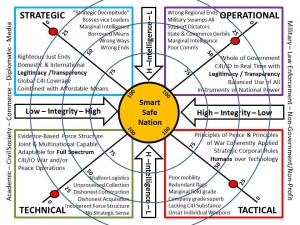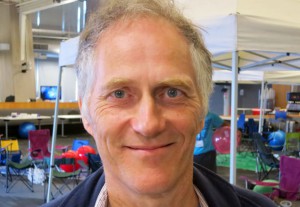
Slide: I2 Quadrants 1.3
See Also:

A start, this is.
Phi Beta Iota: Open Everything (especially OpenBTS, Open Cloud, Open Data, Open Hardware, Open Software, and Open Standards) are the next big leap, or the Internet of Things will be in the service of the elite rather than the 5 billion poor whose entrepreneurial energy can only be harnessed when ALL of them have a free cell phone with Internet access and can receive a free education one cell call at a time.
Also vital in the development of Internet IMPACT as opposed to ACCESS, is the emergence of whole system analytics and true cost economics. Only when ALL have access to true cost information can corruption begin to be detected and eradicated supply chain by supply chain. The nuclear and tobacco and seed industries are three examples of how government corruption and media lies have created massive profit for the few with massive externalized costs to the many.


A Conversation with Tim O Reilly
Edge, [10.4.12]
If we're going to get science policy right, it's really important for us to study the economic benefit of open access and not accept the arguments of incumbents. Existing media companies claim that they need ever stronger and longer copyright protection and new, draconian laws to protect them, and meanwhile, new free ecosystems, like the Web, have actually led to enormous wealth creation and enormous new opportunities for social value. And yes, they did in fact lead in some cases to the destruction of incumbents, but that's the kind of creative destruction that we should celebrate in the economy. We have to accept that, particularly in the area of science, there's an incredible opportunity for open access to enable new business models.
Continue reading “Tim O'Reilly: A Conversation About the Clothesline Paradox”

Repeat itself, foolishness does.
Predicting the future through online data mining
Recorded Future predicts when and where a demonstration will occur after mining from the web all the related activities.
EXTRACT
As it turns out, the software company Recorded Future (which has recently been praised by Wired, the MIT Technology Review and other media outlets, after the CIA and Google invested millions in their services) seems to be offering its clients something similar: a world where emergencies, that is, future events, can be calculated in advance. But how does this start-up actually function, and why are the German philosopher’s concerns relevant to its services?
and
Detecting Emergent Conflicts through Web Mining and Visualization (PDF)
Tip of the Hat to Contributing Editor Berto Jongman.
Continue reading “Yoda: Recording the Future – Repeat Itself, Foolishness Does…”

October 5. Today’s employment report fOrom the Bureau of Labor Statistics shows 114,000 new jobs in September and a drop in the rate of unemployment from 8.1% to 7.8%. As 114,000 new jobs are not sufficient to stay even with population growth, the drop in the unemployment rate is the result of not counting discouraged workers who are defined away as “not in the labor force.”
According to the BLS, “In September, 2.5 million persons were marginally attached to the labor force.” These individuals “wanted and were available for work,” but “they were not counted as unemployed because they had not searched for work in the 4 weeks preceding the survey.”
In other words, 2.5 million unemployed Americans were not counted as unemployed.
The stock market rose on the phony good news. Bloomberg’s headline: “U.S. Stocks Rise as Unemployment Rate Unexpectedly Drops,”
Continue reading “Paul Craig Roberts: A Skeptical Look at Claimed Gains in Employment”